How to show that we are human
Being human is given. But keeping our humanity is a choice.
We are surrounded by screens and algorithms. Where professional masks often hide our vulnerabilities, there exists a power in revealing your humanity.
Not as performance or strategy, but as a truth that liberates both yourself and others.
To show how you are human is not about manufactured authenticity or calculated vulnerability. It's simpler : it's about letting the messy, imperfect reality of your existence be visible.
It’s when a leader admits uncertainty rather than projecting false confidence.
When a parent acknowledges a mistake to their child.
When a teacher shares their own struggle with a concept they now teach effortlessly.
These moments create space for others to breathe, to recognise their own struggles as normal rather than as evidence of inadequacy.
Our humanity lives in the gaps between who we are and who we present ourselves to be. It resides in the "I don't know" that follows a difficult question. In the "I'm still figuring this out" that acknowledges ongoing growth.
In the tremor in your voice when speaking about something that matters deeply to you. These are not weaknesses to be engineered away but rather the very features that make connection possible.
We are drawn to others not through their perfection but through their particularities: the distinctive ways they move through the world, the specific texture of their struggles, and the unique quality of their joy.
The paradox is striking: in revealing what makes you feel most singularly vulnerable, you often touch what is most universally human. The specific details of your experience may be unique, but the experience of having them is shared by every person you will ever meet.
This isn't an invitation to emotional carelessness.
Boundaries matter. Context matters.
Not every space deserves full access to your inner landscape.
In most human exchanges, we err on the side of showing too little rather than too much of our humanity. We polish our presentations beyond recognition. We edit our emails until they sound like they could have been written by anyone.
The power of showing your humanity:
Authenticity creates resonance; people respond to what feels real, not what feels perfect.
Vulnerability invites connection; when you show your struggles, you make it safer for others to acknowledge theirs.
Imperfection is relatable; your "flaws" are often the very things that make others feel they can trust you.
Humanity stands out; we are so surrounded by polished personas that genuine humanness has become remarkably memorable.
The most memorable leaders, teachers, friends, and partners are rarely those who present an image of perfection. They are those who show us how they are human, and in doing so, help us better understand and accept our own humanity.
Don't hide your humanity. It may be the most valuable gift you have to offer to a world starving for authentic connection.



